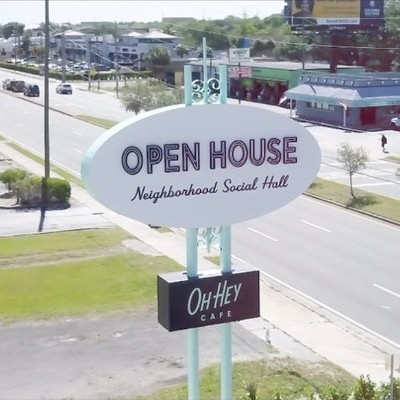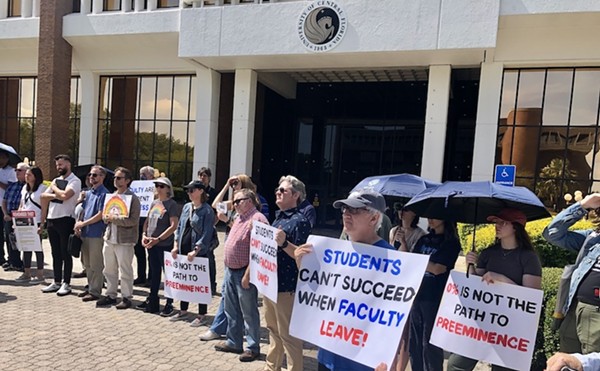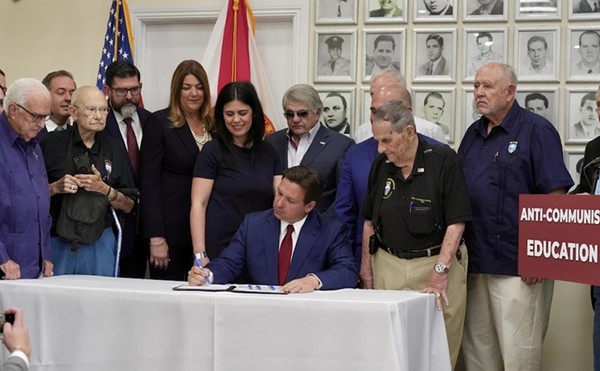In July 2008, George Crossley buttonholed me in the outside smoking area at Club Firestone. I'd invited him to the annual Best of Orlando party, as I'd done every year since we'd met in 2002, and as usual he'd accepted. George didn't miss that party.
Honestly, I tried to avoid him that night because I knew he was going to ask me to be a regular on his new radio show on WEUS-AM (810), The People Power Revolution. I was never keen on being on the other side of a media endeavor, preferring to be the observer rather than the observed; or in this case, the listener rather than the talker.
But there was no hiding from George. You could avoid him, you could delay him, but he'd finally track you down, press your flesh with his big, oddly soft hands and ask a favor. If you believed that Crossley was a grandstanding liberal whose spectacular fall from grace meant he could be safely written off — and a lot of people in Orlando did — then it was easy to say no. To do that required not only ignoring George's passionate intensity derived, perhaps, from a deep need to make amends; it also meant discounting his motives as more televangelistic posturing. In George's case, that felt just a little too cynical for me.
Loosened up by a few drinks and embarrassed by the chase, I agreed to be on the show every Wednesday. And it turned out to be a good time each week, because George was a showman. His perpetual sense of outrage kept The People Power Revolution energized and on point. He delighted in exposing hypocrisy all over the political spectrum, and he had a sharp sense of humor and an eye for the ridiculous. One of my favorite segments was the "Pinhead of the Week."
I saw George in action dozens of times over the years, advocating for health care for union workers, rabble rousing on behalf of immigrant cabbies, videotaping cops to keep them honest and even rallying for this newspaper when the Metropolitan Bureau of Investigation decided it had enough of our critical coverage and set up a sting operation designed to silence it. When Orlando police showed up with trucks to forcibly evict people living under a downtown onramp, George was there to make sure their clothes and medicine didn't get thrown out. When the city concocted a mean-spirited ordinance to keep homeless people from being fed at Lake Eola, George was one of the activists who openly defied it on the basis that everyone deserves to eat, no matter how they look.
George favored action over words. In 2006, when he became president of the Central Florida American Civil Liberties Union, he described the organization in these pages as "a debating society." In 2008, the ACLU had enough of Crossley's publicity stunts and gave him the hook. Howard Simon, the state ACLU's executive director, told Orlando magazine, "Board members have resigned, we've lost members and, I think because of his addiction to media exposure, our credibility and reputation have suffered. The most dangerous place to be is between George Crossley and a TV camera."
Make no mistake — George could be a broken record and a pain in the ass. There probably wasn't a reporter working in Orlando who didn't roll their eyes at the announcement of yet another Crossley press conference. Of course tenacity is the trait that made him effective. You've got to be willing to stand out in the sun and sweat a little, face a few sparse crowds at your press conferences and deflect jabs from detractors to get the job done. George usually, but not always, got the job done.
I moved to Orlando in 2002, so I never knew the fire-and-brimstone Crossley. And he never spoke to me about the 41 months he spent in prison for trying to hire a hit man to kill his mistress' husband. The tapes that convicted him, shot surreptitiously in the back of a car, are chilling, with Crossley coolly discussing the where and how of putting a bullet in a man's head. I don't really know what to think of that, because it's so unlike the man I knew.
If I had arrived in the early '90s, when he was railing on camera against the evils of art, sex education and The Last Temptation of Christ, it's a pretty safe bet that I would have really disliked the man. But I met the reborn George, the shambling conscience with watery blue eyes and a stained dress shirt, the humbled man who used his booming voice and knack for theatrics to crusade rather than condemn. Maybe I'm a bad judge of character, but I believed him. Godspeed, George my friend. You done good.
If I had arrived in the early '90s, when he was railing on camera against the evils of art, sex education and The Last Temptation of Christ, it's a pretty safe bet that I would have really disliked the man. But I met the reborn George, the shambling conscience with watery blue eyes and a stained dress shirt, the humbled man who used his booming voice and knack for theatrics to crusade rather than condemn. Maybe I'm a bad judge of character, but I believed him. Godspeed, George my friend. You done good.
Bob Whitby was the editor of Orlando Weekly from 2002 until April, 2010. He currently edits Vegas Seven magazine in Las Vegas.
[email protected]


















